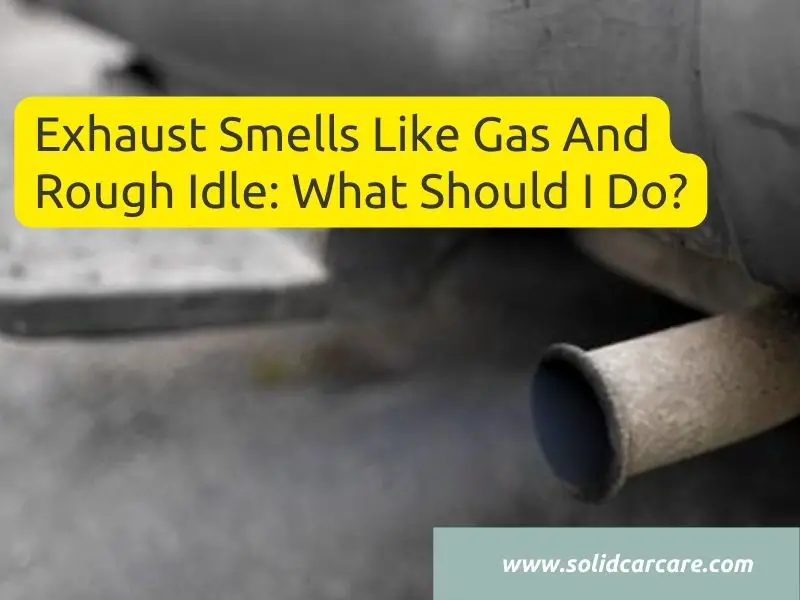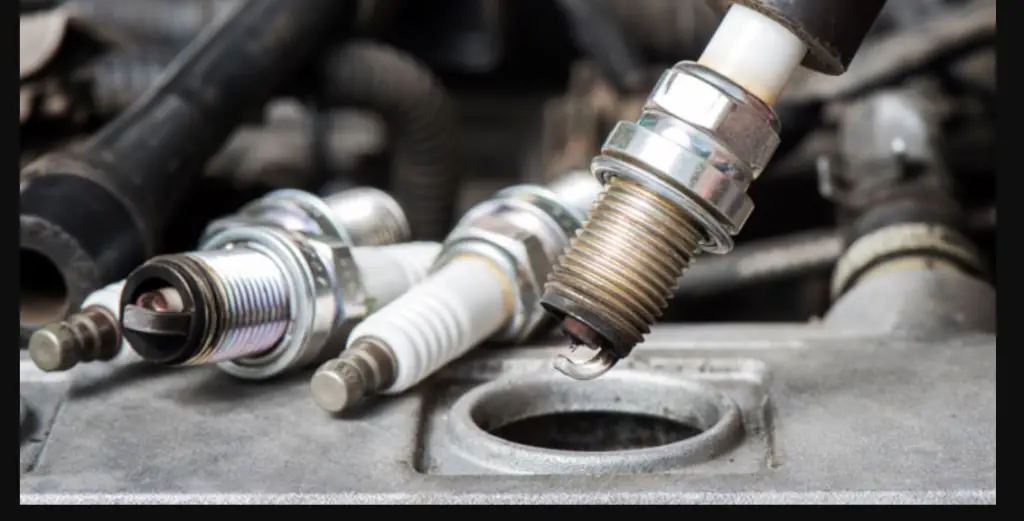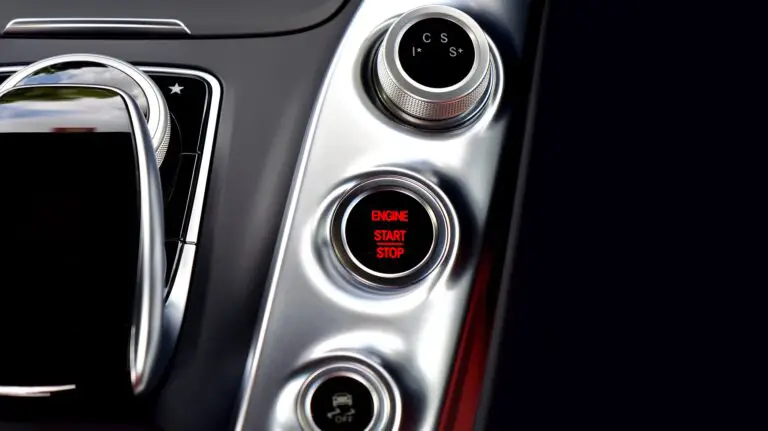Exhaust Smells Like Gas And Rough Idle: What Should I Do?

Are you tired of that lingering gas smell from your car’s exhaust, accompanied by an annoying rough idle? Well, you’re not alone. These worrisome signs indicate that there’s an underlying issue with your engine that needs immediate attention.
But don’t worry, we’re here to help you understand the potential causes and what steps you can take to resolve this problem. So, buckle up and get ready to uncover the mysteries behind the gas smell and rough idle.
Table of Contents
- Key Takeaways
- Fuel System Issues
- Ignition System Issues
- Vacuum System Leaks
- Other Potential Causes
- What to Do
- Conclusion
- Some related FAQs.
Key Takeaways
- A strong gas smell from the exhaust combined with a rough idle indicates potential issues within the car’s engine.
- Possible causes include fuel system issues such as a rich engine mixture or a leaky fuel injector, ignition system issues like faulty spark plugs or ignition coils, and vacuum system leaks like a leaking intake manifold gasket.
- Other potential causes include a dirty air filter or an exhaust leak.
- It is important to stop driving the car with these symptoms and seek the assistance of a qualified mechanic to diagnose and repair the issue promptly.
Fuel System Issues
If your exhaust smells like gas and you’re experiencing a rough idle, it’s likely that you’re dealing with some fuel system issues. One possible cause is a rich engine mixture, where there’s too much fuel compared to air, leading to incomplete combustion and the gas smell.
Another potential culprit could be a leaky fuel injector, which can result in excessive fuel in the cylinder and contribute to a rough idle.
It’s important to address these issues promptly to prevent further damage to your engine.
Rich Engine Mixture
A rich engine mixture occurs when the engine is receiving an excessive amount of fuel compared to air, leading to incomplete combustion and unburned fuel exiting through the exhaust. This can be caused by faulty sensors like the oxygen sensor, a malfunctioning fuel pressure regulator, or clogged fuel injectors. A leaky fuel injector can also contribute to a rich mixture and a rough idle. Faulty spark plugs or ignition coils can result in misfires, where the fuel doesn’t properly ignite, causing unburned fuel to exit through the exhaust.
Leaking intake manifold gaskets can allow unmetered air to enter the engine, disrupting the air-fuel ratio. Other potential causes include a dirty air filter or an exhaust leak. To diagnose a rich engine mixture, a mechanic will likely run a diagnostic scan and perform tests to identify the specific issue.
To prevent a rich engine mixture, it’s important to maintain and replace faulty sensors, regulate fuel pressure, clean fuel injectors, and ensure proper air intake.
Leaky Fuel Injector
The leaky fuel injector in your car’s fuel system can cause an imbalance in the air-fuel mixture, leading to rough idle and a strong gas smell from the exhaust. A leaking fuel injector allows fuel to continuously drip into the cylinder, even when the engine isn’t firing. This results in an excessive amount of fuel being present, which disrupts the combustion process and leads to a rough idle.
Additionally, the unburned fuel exits through the exhaust, causing the strong gas smell. To diagnose and repair a leaky fuel injector, it’s important to consult a qualified mechanic. They’ll perform diagnostic tests to identify the specific issue and may recommend replacing the faulty injector to prevent further damage and restore the proper air-fuel mixture.
Regular maintenance, such as cleaning the fuel injectors, can help prevent future leaks and ensure the smooth operation of your car’s fuel system.

Ignition System Issues
Now let’s turn our attention to ignition system issues that could be causing your exhaust to smell like gas and your engine to have a rough idle.
One possible culprit could be faulty spark plugs or ignition coils. Worn or fouled spark plugs can lead to misfires, resulting in unburned fuel exiting through the exhaust and contributing to the rough idle.
Additionally, weak or failing ignition coils can also cause misfires.
Faulty Spark Plugs or Ignition Coils
Worn or fouled spark plugs and faulty ignition coils can significantly impact the performance and efficiency of your car’s ignition system. Here are some key points to consider when it comes to spark plug and ignition coil issues:
- Spark Plug Maintenance: Regularly inspect and replace spark plugs as part of your car’s maintenance routine to prevent misfires and ensure proper combustion.
- Signs of Ignition Coil Failure: Look out for symptoms such as engine misfires, decreased fuel efficiency, and difficulty starting the engine, as these can indicate a failing ignition coil.
- Troubleshooting Rough Idle: A rough idle can be caused by spark plugs that are worn, fouled, or improperly gapped, or by faulty ignition coils that aren’t delivering enough voltage to the spark plugs.
- Common Causes of Misfires: Misfires can occur due to spark plug issues, such as worn electrodes or excessive carbon buildup, as well as faulty ignition coils that aren’t producing the necessary electrical charge.
- Diagnosing Spark Plug Issues: To determine if spark plugs are the culprit, a mechanic may use a spark tester to check for a strong spark, inspect the plugs for signs of damage or wear, and perform a compression test to assess the overall health of the engine.

Vacuum System Leaks
If you’re experiencing a strong gas smell from the exhaust and a rough idle, one potential cause could be a leaking intake manifold gasket.
This gasket is responsible for sealing the connection between the engine and the intake manifold, and if it develops a leak, unmetered air can enter the engine, disrupting the air-fuel ratio and leading to a rich mixture.
This can result in a rough idle and the presence of a gas smell in the exhaust.
Leaking Intake Manifold Gasket
The presence of a leaking intake manifold gasket can cause various issues within your car’s vacuum system, leading to disruptions in the air-fuel ratio, a rough idle, and the distinct smell of gas coming from the exhaust.
Here are some potential causes and what you can do:
- Symptoms and signs of a leaking intake manifold gasket include a rough idle, decreased engine performance, and a hissing sound from the engine.
- To diagnose a leaking intake manifold gasket, you can perform a visual inspection for signs of oil or coolant leaks around the gasket, use a smoke machine to detect vacuum leaks, or conduct a pressure test.
- Common reasons for a leaking intake manifold gasket include age and wear, thermal expansion and contraction, improper installation, or excessive torque.
- To repair a leaking intake manifold gasket, you’ll need to remove the intake manifold, clean the mating surfaces, replace the gasket, and reassemble the components.
- Preventative measures to avoid a leaking intake manifold gasket include using a torque wrench to ensure proper installation, avoiding excessive heat and over-tightening, and regularly inspecting the gasket for signs of wear or damage.
Other Potential Causes
Now let’s consider some other potential causes of the gas smell and rough idle.
One possibility is a dirty air filter, which can restrict airflow and result in a rich mixture. This can lead to similar symptoms as a rich engine mixture, such as rough idle and the smell of gas.
Another potential cause could be an exhaust leak, although this is less likely. An exhaust leak can draw unburned fuel into the exhaust stream, causing the gas smell.
Dirty Air Filter
A dirty air filter can restrict airflow, leading to a rich mixture and contributing to symptoms like a rough idle and a gas smell from the exhaust. Regular maintenance of the air filter is crucial to prevent these issues. Here are some important points to know about a dirty air filter:
1) Signs of a dirty air filter:
- Reduced engine performance and power
- Decreased fuel efficiency
- Black smoke from the exhaust
- Engine misfires or hesitation during acceleration
2) Importance of regular air filter maintenance:
- A clean air filter allows for proper air intake, ensuring the correct air-fuel ratio for optimal combustion.
- It protects the engine from dirt, debris, and contaminants that can damage internal components.
3) How a dirty air filter affects engine performance:
- Restricted airflow leads to a rich fuel mixture, causing incomplete combustion and decreased engine efficiency.
- It can result in a rough idle, reduced horsepower, and increased emissions.
To address a dirty air filter, you can either clean or replace it, depending on the type of filter and its condition. Regularly inspecting and maintaining the air filter will help ensure your engine performs at its best.
Exhaust Leak
If the gas smell from your exhaust and rough idle persist despite ruling out a dirty air filter, another potential cause to consider is an exhaust leak. Common signs and symptoms of an exhaust leak include a hissing or popping sound coming from the exhaust system, a noticeable decrease in engine performance, and potentially visible cracks or holes in the exhaust pipes or manifold.
To locate and diagnose an exhaust leak, you can visually inspect the exhaust system for any signs of damage or leakage, use a smoke machine to identify the exact location of the leak, or listen for any abnormal sounds while the engine is running.
Driving with an exhaust leak can be dangerous as it can lead to increased levels of carbon monoxide inside the vehicle, which can cause dizziness, headaches, and even death. If you suspect an exhaust leak, it’s important to get it repaired as soon as possible. In the meantime, you can use DIY methods such as exhaust tape or putty to temporarily seal the leak.
Regular maintenance, including checking the exhaust system for any signs of damage, is essential to prevent exhaust leaks and ensure the safety and performance of your vehicle.
What to Do
To address the issue of a strong gas smell from the exhaust and a rough idle, there are several steps you should take to diagnose and resolve the problem. Here’s what you need to do:
- Stop Driving: Driving with these symptoms can cause further damage to your engine. Get your car to a qualified mechanic as soon as possible.
- Describe the Symptoms: Tell the mechanic about the gas smell, rough idle, and any other relevant information like recent repairs or any warning lights on the dashboard.
- Diagnostics: The mechanic will likely run a diagnostic scan to check for error codes and perform tests to pinpoint the specific issue.
- Repair: Once the cause is identified, the mechanic can recommend the appropriate repair, which may involve replacing faulty sensors, injectors, spark plugs, coils, or gaskets, cleaning the air filter, or fixing any leaks.
- Regular Engine Maintenance: Preventive measures such as regular engine maintenance, including changing spark plugs, fuel filters, and air filters, can help prevent these issues from occurring in the future.
Conclusion
In conclusion, if you’re experiencing a strong gas smell from your car’s exhaust, accompanied by a rough idle, it’s crucial to address the issue promptly.
Fuel system issues, ignition system problems, vacuum system leaks, and other potential causes can contribute to these symptoms.
Taking your car to a qualified mechanic for diagnosis and repairs is essential to ensure the health and performance of your vehicle.
Don’t ignore these red flags, as they can indicate underlying engine problems that need attention.
Some related FAQs.
How do you know if you have an exhaust problem?
Typically, an increase in engine noise is the first observable sign of an exhaust leak. Your system’s manifold or any of the joints along the exhaust system are where an exhaust leak is most likely to occur.
Your engine’s volume will increase if the leak is in the manifold, and the passenger compartment may also become filled with poisonous fumes.






